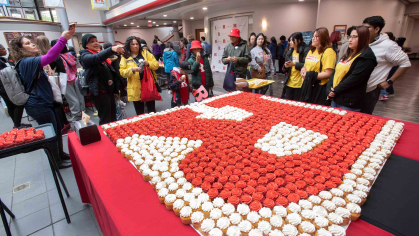Rutgers Course Teaches the Value of Random Acts of Kindness

What would happen if you committed to performing a random act of kindness every week? For students in the Master of Business and Science (MBS) degree program, Professor Kathleen Cashman created a unique assignment to teach that leadership is more than just a bullet point on a resume.
Cashman implemented a multiweek assignment encouraging students to participate in random acts of kindness and document the impact in the program’s signature course, “Principles of Communication and Leadership,” which focuses on effective communication and the attributes, traits and behaviors of leadership.
These acts could be as simple as paying for someone's coffee, leaving a note of encouragement or helping a stranger in need.
But how, exactly, do random acts of kindness help build leadership skills?
Through service.
“Leaders serve,” Cashman said. “From the dawn of time – it's not a new concept.”
A leader serves their team by guiding, inspiring and removing obstacles. Leaders also serve their organization by holding a vision, building a team and creating partnerships, Cashman said.
“My philosophy is that leadership bears no title, and we, as leaders today, need to build a habit of serving,” she added.
To prepare students for this assignment, Cashman shows a documentary called The Gift. In it, a scientist provides the formula for how one act of kindness can change the world. Cashman also shares the story of Chris Rosati, diagnosed with ALS, who was gifted a Krispy Kreme truck and donuts to give away. He inspired thousands of others—primarily children—to spread random acts of kindness.
Cashman’s students – science-based professionals who receive a blended curriculum of science and business – reported their own random acts of kindness in and out of the workplace, and their impressive impact.
For Aarthi Gajendran, an MBS student, what started as a single act quickly grew to involve her local community. Gajendran used Facebook Marketplace to donate toys and books that her children had outgrown. She met someone who collected the items for a nonprofit organization helping underprivileged children. After visiting the shelter to learn what other supplies were needed, Gajendran and friends organized a larger collection for more items including art supplies, crafts, winter clothing and canned goods. Local middle and high school students joined in to help collect items from around Gajendran’s neighborhood.
“I was able to appreciate my life better,” she said. Before working on the project, Gajendran had felt drained from working full time, taking courses and managing her home. She didn’t have the time or energy to socialize, and she was starting to feel lonely.
“Through this helpful act,” she continued, “I was able to meet like-minded people, some selfless and humble teachers. Little things that we did were satisfying. It made me realize that kindness is infectious. All it needs is a trigger to spread.”
After a semester of service, many students reported feeling satisfied and stepping outside of their comfort zones. Students wrote to Cashman about performing acts of service for their loved ones, lending a hand to a stranger at the grocery store, organizing charity events and giving to those in need.
“We’ve had so many wonderful submissions, and they all have a different magnitude,” said Cashman.
MBS student and veteran of the United States Navy James Ryan performed a series of acts of kindness to help fellow veterans prepare for life after a career of service to our country through The Honor Foundation, a career transition program for U.S. Special Operations Forces, and The Letterman’s Club, a career transition program for collegiate athletes and military veterans. Ryan helped veterans translate their military service to the private sector by offering guidance on how to craft resumes, prepare for interviews, enhance LinkedIn profiles, and more.
Students learn that it doesn’t take much time to significantly impact their communities, said Cashman. Her goal is for kindness and serving to be automatic thoughts for her students. The course aims to build leaders, and serving is a significant strength.
“We’re creating leaders who look to make an impact wherever they are,” said Cashman.
Cashman encourages students to factor leadership into every aspect of their careers and education. The Master of Business and Science degree helps students further their careers, said Cashman. Students sharpen their scientific knowledge while learning valuable business skills – including leadership, which is essential for career advancement.
“Leadership is not extra,” said Cashman. “It needs to be part of how you accomplish everything else.”


